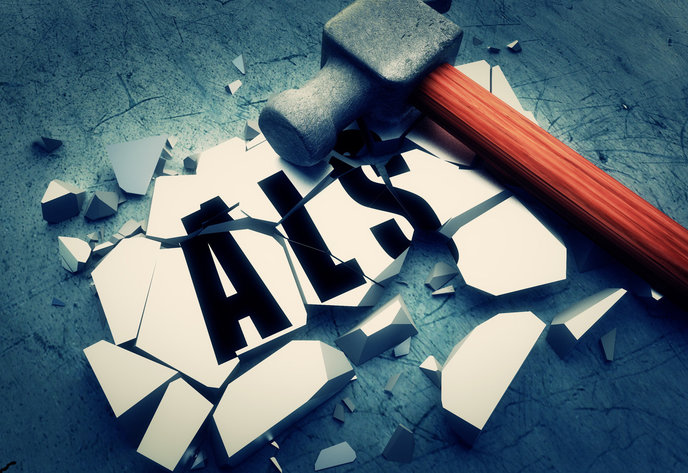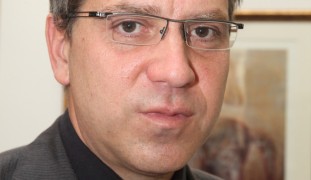
As the Ice Bucket Challenge raises millions for research into amyotrophic lateral sclerosis (ALS), an Israeli treatment to ease symptoms and slow the progression of ALS and other incurable neuromuscular diseases is going into Phase 2 clinical trials in three major US medical centers.
Petah Tikva-based BrainStorm Cell Therapeutics’ NurOwn platform is based on a technique developed by Profs. Daniel Offen and Eldad Melamed at Tel Aviv University for growing and enhancing stem cells harvested from patients’ own bone marrow. The enhanced cells secrete elevated levels of nerve-growth factors that protect existing motor neurons, promote motor neuron growth and reestablish nerve-muscle interaction.
Last June, the publicly traded BrainStorm raised $10.5 million in private investments, and in July it was notified of the allowance of its US patent application.
Two initial trials conducted at Jerusalem’s Hadassah University Medical Center led by stem-cell transplant pioneer Dr. Dimitrios Karussis, head of Hadassah’s Multiple Sclerosis Center, showed promising preliminary results in 24 patients.
“We are working on analysis of the data, but we can say there is some positive effect,” Karussis tells ISRAEL21c.
“In some of the parameters there was up to a 60 percent beneficial response after the treatment. We hope in the next three months we will have a paper ready to be published.”
The soldier and the rabbi
Four ALS patients in an advanced stage of disease received NurOwn transplants at Hadassah starting in 2012 as “compassionate use” cases, including Omri Chotam, a former paratrooper in his 20s, and octogenarian sage Rabbi Rafael Shmuelevitz.
All four are alive as of this writing. Globally, some 90% of ALS patients die of respiratory failure within three to five years after the onset of symptoms, though a new study shows that in Israel, 20% of ALS patients survive past 10 years, possibly due to earlier diagnosis and treatment. As the disease progresses, patients lose the ability to stand or walk, and have difficulty breathing as the muscles of the respiratory system weaken.
“All four had, at least for three to six months, a response of improvement in respiratory function or muscle power,” reports Karussis.
”The most impressive response was in the rabbi, who had a very severe and unique combination of ALS and myasthenia gravis. He improved for about six months substantially, started walking and speaking, and then the effects faded and then we did a second injection and he had even more impressive improvement. This makes it highly unlikely to be a placebo effect, which is important to note.”
Chotam also received two additional NurOwn injections through the compassionate use program, resulting in functional improvements and halting the progression of the disease for about 18 months now.
“According to the data we have, the treatment makes a beneficial change in the progression of the disease. This is the first step. Now the US study is starting, and we are collaborating and consulting with them,” says Karussis. “We probably need to improve the protocol to do multiple injections for the longer term, and find the best way of administration in each individual patient.”
No mysteries
BrainStorm CEO Dr. Tony Fiorino tells ISRAEL21c that 48 patients will participate in the multicenter, double-blind, randomized trial beginning in Massachusetts General Hospital, the University of Massachusetts Memorial Hospital and the Mayo Clinic.
“Each of the three sites is headed by important thought leaders in the field of ALS,” he notes.
In this study approved by the US Food and Drug Administration (FDA), 36 of the patients will receive NurOwn enhanced stem cells from their own marrow, and 12 will receive a placebo. After the study is completed in early 2016, the results will be analyzed for safety and efficacy.
Fiorino says, “This is really a platform technology with applications outside of ALS, though ALS is our lead indicator. The cells can apply in any disease where neurons are dying,” such as multiple sclerosis and Parkinson’s.
“There are many companies in the stem-cell space,” he adds. “What makes us unique, first of all, is that we’re in the clinical phase. Secondly, many others have a ‘shotgun approach’ in which they use early stem cells with the potential to turn into differentiated cells. We have taken our cells and converted them into factories that pump out growth factors. We know exactly where we want to use them; there are no mysteries.”
Fiorino says BrainStorm’s approach is “highly innovative and proprietary, and represents a fruitful collaboration between an Israeli academic institution and an Israeli biotech company.”
Meanwhile, Karussis is starting a large placebo-controlled study with multiple sclerosis patients at Hadassah, not connected with BrainStorm but also using modified stem cells.
See the company’s website for more information.
















